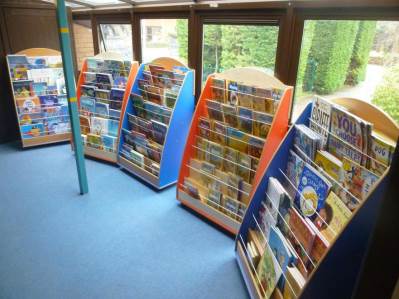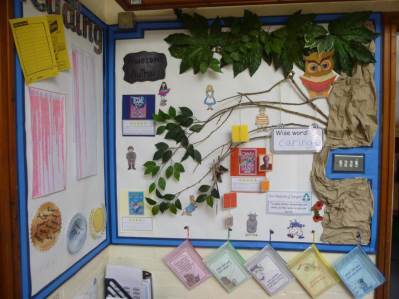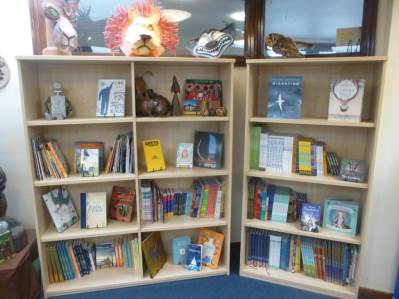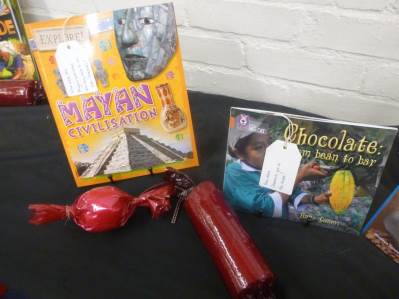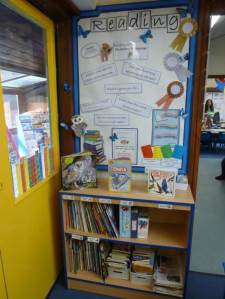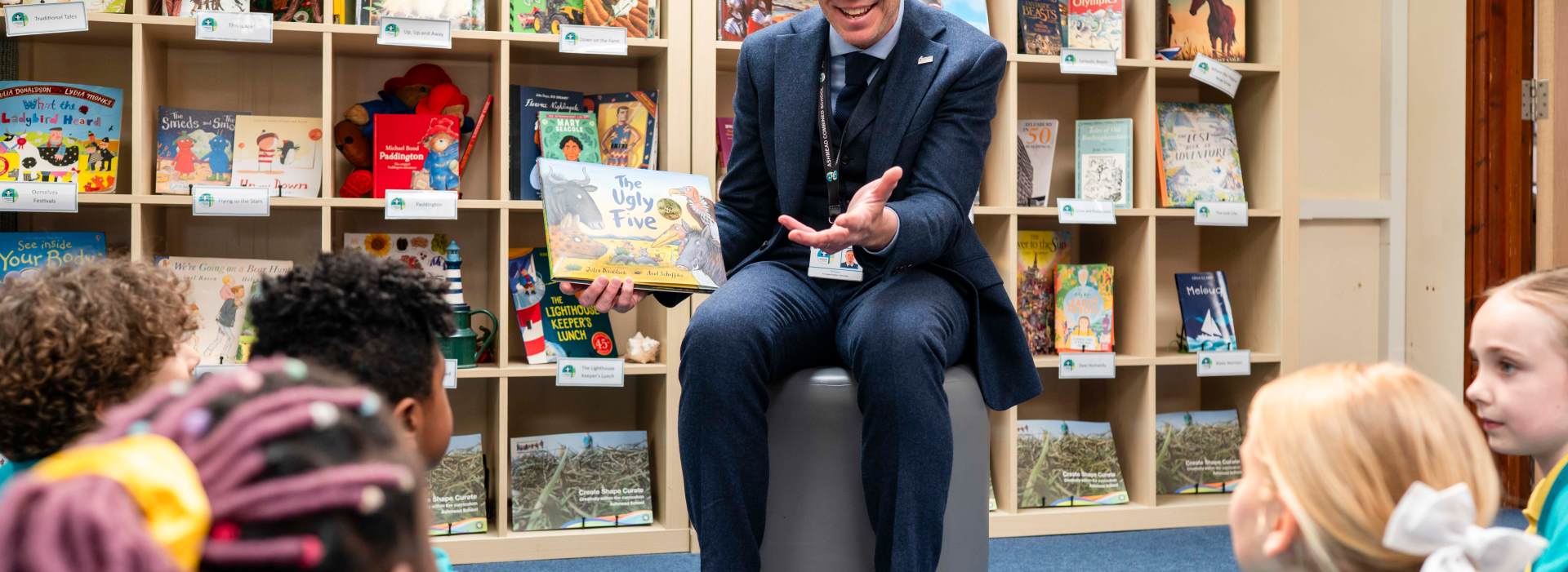
Reading
 Intent
Intent
At Ashmead school, we intend for our readers to become fluent and confident when leaving primary education, maintaining a passion for reading and having a love of a wide range of literature. Reading is a key driver within our curriculum and enables pupils to develop culturally, emotionally, socially and spiritually. We foster a love of reading where pupils develop the habit of reading widely and often for pleasure, feeding their imaginations and opening up a treasure-house of wonder and joy for curious young minds, and to acquire knowledge and information to build on what they already know across the curriculum. We aim to develop both word-reading and comprehension. Robust and progressive teaching of Phonics will develop pupils’ confidence and competence with word reading and decoding to ensure the speedy recognition of words and arm them with strong foundations for reading from which to build. Comprehension skills are developed through high-quality discussions and draws from linguistic knowledge and knowledge of the world. Pupils will develop a rich vocabulary, knowledge of themselves and the world in which they live and have an appreciation for our rich and varied literary heritage.
Implementation
Pupils are provided with ample opportunities to develop their love of reading, and reading skills, across the curriculum on a daily basis within taught reading sessions and through class novels.
The effective systematic teaching of Phonics has high priority throughout Early Years and Key Stage 1, and is taught daily through the Little Wandle Phonics Scheme to all pupils in EYFS, Year 1 and those in Year 2 who have not yet passed the Phonics Screen Check. This ensures pupils build on their growing knowledge of the alphabetic code and are able to master Phonics to read and spell as they move through school. Reading is taught through a ‘Reading Squad’ approach where teachers plan and resource for a team of adults to deliver guided reading sessions daily. Within Key Stage Two, where appropriate, timely intervention is planned for those pupils who are working below expected levels, as soon as needs are identified. Reading books are closely matched to the abilities of all pupils, including those who are developing phonic knowledge.
From Year 2, all pupils take part in five reading lessons per week, which teach a variety of comprehension skills through a wide range of carefully chosen texts. Scheduled ‘Book Club’ sessions, where pupils and teachers participate in high quality discussions, share personal recommendations and celebrate themes, characters, plots and stories, also happen on a weekly basis. Pupils are encouraged to try new authors and expand their choices. Teachers regularly read with pupils enabling pupils to get to know and love a variety of stories, poetry and information books.
As pupils’ phonic knowledge is embedded, the range of books that pupils can read independently expands rapidly. Texts which develop vocabulary, and the breadth and depth of their reading, are available. See Reading at Home section for further information.
Engaging learning environments are equipped with a wide range of high-quality fiction and non-fiction texts which celebrate classic and current literature, and represent equality and diversity both in content and by author, while considering Cultural Capital. Each overarching curriculum theme is also supported by a wide range of texts.
Pupils are also provided with a list of suggested texts to read at each year of their primary education, and these are accessible within their classroom libraries. Additionally, the Ashmead ‘Book Nook’ acts as a lending library for pupils to borrow and exchange books on a regular basis and promote a love of reading at home.
Ashmead celebrates World Book Day annually across the school, where the focus of the day’s activities centres around reading for pleasure. Author visits are also planned into the curriculum, further inspiring pupils and igniting their imagination.
We have a strong focus on language development for our pupils because we know that speaking and listening are crucial skills for reading and writing in all subjects. Within classes, pupils have the opportunity to work independently, but are also given the opportunity to work within a range of different groupings, as per the Oracy Voice21 project pupil groupings, to support the reading process, e.g. learning from each other, respectfully receiving feedback on learning, acting as a knowledgeable other, rehearsing and preparing their ideas, and exploring misconceptions. Pupils are also taught the conventions for talk (through the developing use of Talk Tactics) to support discussions and debates, allowing pupils to elaborate and explain their understanding and ideas, as well as giving them the confidence to formally present.
Ashmead aims to develop language and vocabulary through in-depth book discussions on a range of quality texts and debates, as well as through reading a wide variety of increasingly complex texts. Environments across the school build upon prior knowledge, continually developing quality talk and discussion, and allow pupils to become “word rich”.
Our intention is that pupils will develop a love of reading during their journey through the school. Driven not just by the long-term benefits of reading (academic success, knowledge of the world, emotional well-being) but in the knowledge that if we implement a nurturing, engaging and inquisitive environment, pupils will discover the intrinsic value in reading, in that moment. Ashmead believes that in creating this environment, we will naturally create curious minds, ready to reap the benefits that the literary world has to offer.
Impact
Pupils leave Ashmead School with a love of reading. They are well prepared for the next stage of their schooling, and able to read fluently, and with confidence, in any subject in their forthcoming secondary education.
Pupil outcomes are monitored by: work-sampling, pupil voice interviews, listening and learning explorations, drop-in sessions, moderations and within team and staff meetings. The reading lead identifies clear next steps to assess impact and inform the School Development Plan, which are determined by a cycle of monitoring, evaluating and reviewing. Pupil progress is carefully monitored to ensure pupils are prepared for the next stage of their education and ready for life in the wider world.
Our values: Reading
To achieve our vision, our practice is underpinned by the following values:
Communication
We aim for all pupils to communicate confidently and effectively through the spoken and written word.
- High quality book talk: At Ashmead, we provide our pupils with opportunities across the curriculum for high quality book talk. This can be teacher or peer led; through debates, discussions and across curriculum lessons. Texts are chosen for their richness in vocabulary, as well as their diversity, and we encourage reading for pleasure; always prioritising increasingly complex texts.
- Performances: Through the progression of the National Curriculum, performances of compositions, playscripts and poetry all occur throughout the classroom. Pupils develop intonation, tone and volume to express themselves and their character.
- Justifying: Using skills such as referring to the text, justifying their answer and using evidence to formulate ideas in the spoken and written word.
Respect
We aim for all pupils to have respect for themselves, others and the world in which we live.
- Books and Library Spaces: Book monitors, classroom monitors and library spaces are looked after; with teachers setting expectations for nurture and care for our books. Classroom libraries are established and teacher displays show the progression of reading throughout the year.
- Listening: Story time, 1:1 reading and the sharing of ideas is firmly routed in respect. At Ashmead, we respect that all readers are at different stages and should celebrated for being brave to read new words, be different characters and share stories.
- Diversity: Diversity is celebrated throughout the school, with pupils encouraged to expand on their reading or author choices by looking at new texts suggested by the teacher, ‘Books to read before’, or listening to peer recommendations.
Engagement
We aim for all pupils to engage in opportunities for learning to gain knowledge and understanding.
- Planning for Phonics and Early Reading: At Ashmead, we use phonics to teach early reading backed up by our assessment and interventions where necessary. We have a comprehensive plan to ensure that early reading and phonics interventions can be accessed by all students who need it.
- A Focus on Quality Texts: We provide access to a wide range of age-appropriate high-quality texts (increasingly complex texts), including both fiction and non-fiction. Our teachers are knowledgeable about literature and use their expertise to help pupils choose texts that match their interests and reading comprehension levels.
Aspiration
We aim for all pupils to challenge themselves, showing the belief and the resilience to succeed.
- Regular Assessment and Adaptive Teaching: Our teachers regularly assess pupils' reading comprehension and adapt the teaching and learning to ensure all pupils can access the curriculum. We use a range of assessment tools to identify strengths and weaknesses and use the outcomes to tailor our teaching.
Teamwork
We aim for all pupils to recognise and appreciate the value of achievement through collaboration.
- Collaboration: Working together on playscripts, performances and debates is a key part of our progression and learning.
- Peer Assessment: The sharing of thoughts and ideas and providing feedback to others is integral part of reading.
Enjoyment
We aim for all pupils to enjoy their learning and wider experiences.
- A Rich and Varied Curriculum: We have a curriculum that is enriched with reading opportunities in all subjects. We provide regular opportunities for pupils to read in all areas of the curriculum and we encourage pupils to read at home.
- Developing Reading for Pleasure: We have developed and nurtured a culture around reading; our school provides quality events and opportunities for pupils to get involved in reading beyond the classroom such as World Book Day, story time, Book Club, ‘Books to Read Before’, and our school reading awards. We celebrate and reward pupils for their achievements in reading.
Progression Documents
Reading
Key Websites
Purple Mash
One of the main resources that we use for Reading is Purple Mash. Please contact your child's class teacher if you need help with logins or access.
Purple Mash - Serial Mash - https://www.purplemash.com/
Reading Eggs - KS1 - www.readingeggs.co.uk
The children have logins on their reading records and they can access Reading Eggs and Fast Phonics. The activities are game related and fun and lots of different types of text to enjoy. The activities are child friendly and children can enjoy building up rewards. Books and activities develop phonic skills, vocabulary, comprehension and fluency.
Other useful websites:
- https://www.bbc.co.uk/bitesize/
- https://classroom.thenational.academy/subjects-by-key-stage
- https://www.bbc.co.uk/newsround
- https://www.oxfordowl.co.uk/
Reading At Home
Reading books are sent home regularly with a child’s reading record, which can be filled in by teacher, teaching assistant, parent or child. Books are allocated (or selected by the children, if appropriate) from central locations across the school. The books are published by Little Wandle or Oxford Reading Tree and are colour coded (or numbered) and linked to the National Book Band scheme. These book bands in turn link to the National Curriculum levels, assessment grids and support materials used by staff. Once a child is a confident, fluent reader and is successfully able to comprehend the final numbered stage of Oxford Reading Tree (Stage 16) accurately, they become a ‘Free Reader’. This final stage allows the children to choose their own reading material from a wide range of authors that the children themselves have selected – to help foster, maintain and embed a love of reading.
Children are also allowed to bring home a ‘bedtime story’ (Early Years and Year 1) or a ‘library book’ (Year 2 – Year 6). This is to encourage children to pick a book for pleasure, alongside their designated reading book. Lower down the school, these books can be read to them by a parent, to allow children the opportunity to escape into the book and access the vocabulary and comprehension.
Parent Guide to Reading Record Comments
Listed below are some comments which may help you when writing in your child’s Reading Record Book to describe how your child has read at home. It is important to record both positive and developmental comments, as this will help both teachers and parents gain a better understanding about how your child is progressing. The statements below are just a guide; please feel free to adapt the wording and write comments which you feel appropriate.
- Read familiar words independently
- Able to predict what happens next in the text
- Read with good expression
- Showed good understanding of the text
- Worked out new words independently
- Worked out new words by sounding them out
- Summarised the story and characters well
- Enjoyed reading this book
- Self-corrected own errors independently
- Used the picture cue and the first sound of a word to work out words
- Read with fluency
- Struggled to concentrate
- He/she made a number of errors because he/she was not looking carefully enough
- Would not read tonight
- Found this book hard to read
- Able to read this book with a lot of support
- Struggled to work out the vocabulary
- We still need to work on his/her fluency
- Found it difficult to comprehend was he/she has read
Reading Records
Books to Read Before...
All classrooms across the school have classroom libraries. These books will be available for your children to take home, and are based around encouraging reading for pleasure; they will become the children's ‘library book’. In Key Stage 1, they will be called your 'Bedtime story'. If a child is also reading an additional reading scheme book, they will be taking home that book as well – meaning that they will have two reading books to enjoy. We ask that the children take care of their new library book, as they will not be able to take another reading book home until they have returned the book they already have.
All reading counts towards a child's reading awards, so ask you to write down in their reading records anything that they read, whether it be a book from school or home, leaflets, an ebook/kindle, a newspaper/magazine/comic - we value lots of different types of reading.
In addition to their library book and reading record, in Years 2 and up, on display in classrooms will be posters of 'Books to Read before' recommendations. The posters contains a selection of books that we are recommending the children read by the end of the academic year. Please note the list is entitled 'Books to Read by the end of Year …' - we ask that the children try to read them over the course of the year. There are a selection of different types of books and themes to encourage children to read a variety of texts. These books are also in our library collection so are available for all children to access. When your child has read a book, they can celebrate with their teacher and class and we can tick it off the classroom poster. We would love for children to discuss what they have read with the class during book talk, and recommend any of the reads that they have enjoyed to their peers. Additionally, children can also discuss with teachers their own favourite reads and let us know of any firm favourites and why they are so enjoyable to read. We might even be able to purchase these for the school in the future.
Thank you very much for your support with this; we really hope that your child enjoys reading this year and takes real pleasure and excitement in their reading. Reading a small amount every day has an immeasurably positive impact on all areas of your child's learning and well-being.







